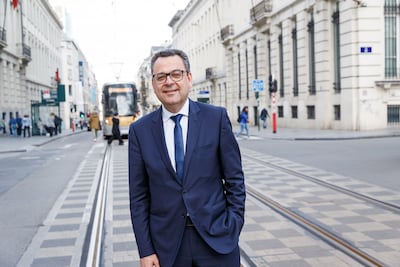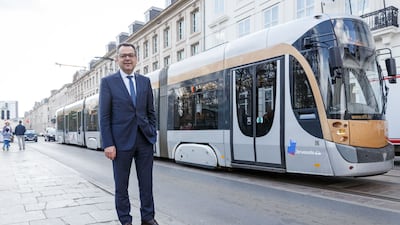Cities around the world are emerging from lockdowns into gridlocks as road traffic returns to pre-pandemic levels, according to the Secretary-General of UITP, the International Association of Public Transport, Mohamed Mezghani.
Without a revolution in mass transit, Mr Mezghani says that people will have to abandon hope of the quieter future glimpsed under coronavirus restrictions, when streetscapes were reclaimed for exercise, dining and enjoying urban environments.
He argues that a redefined public transport system in a “green alliance” with walking and cycling is the most efficient means of making the vision a reality, moving people instead of countless cars.
Yet most governments have failed to either financially support the sector devastated by drastically reduced demand since the spread of Covid-19, or decisively act to limit the use of cars.
“Public transport is experiencing a paradoxical situation: on the one hand, there’s a consensus on its essential role in providing mobility for all, but, on the other hand, most policymakers don’t see its benefits for society, the economy and the environment,” Mr Mezghani told The National.
“It’s like it has had to sustain itself while they generally support other sectors, such as the automotive industry or airline travel.”
His comments come as the motor giant Ford announced that its at-risk transmission factory in Halewood on Merseyside would be upgraded to make electric car parts with financial help — reportedly £30 million ($41m) — from the UK Government’s Automotive Transformation Fund.
Mr Mezghani said that simply adopting new technologies was not a panacea in the drive towards net zero emissions, painting a picture of carbon neutral regions heavily congested with electric vehicles.
It made little sense, he said, for governments to issue “rosy statements about 2050 and 1.5°”, while beleaguered public authorities and local transport operators faced with fewer passengers and fares were cutting services.
“Even having zero-emission cars will not solve the issue because a green traffic jam is still a traffic jam,” he said.
“Indeed, sustainability is not just about the environment but about making our cities more accessible, more inclusive, safer, healthier and prosperous.
“This is only possible if we opt for people-focused solutions — which is what public transport is all about.”
In the past, Mr Mezghani said, metro systems around the globe carried 168 million passengers a day, 14 times more than domestic and international airlines. Taking a bus consumed up to four times less fuel per passenger, compared with the average occupancy rate of 1.2 for a privately-owned single-use car journey.
“Public transport itself is the way to reduce energy consumption and greenhouse gas emissions,” he insisted, especially now that networks are doing their homework and emitting fewer pollutants and greenhouse gases.
Mr Mezghani, who recently called out the Manchester United football team for conveying a poor message to fans by taking a 10-minute flight to Leicester, will travel from Paris to the forthcoming Cop26 climate change conference in Glasgow by train.
Once there, UITP — a non-profit advocacy organisation for public transport authorities and operators, representing an international network of 1,800 member companies in more than 100 countries - will jointly host a high-level event with the International Union of Railways on board the HydroFLEX train.
Later in the day, Mr Mezghani and other stakeholders will discuss the ambitious mobilisation of sustainable transport for both climate change action and a resilient, just recovery.
With ridership at about 60 or 70 per cent of pre-Covid levels, he espouses a redefinition of mass transit to not only encourage more passengers back, but also to provide diverse solutions to changes in working habits and preferences for less-crowded vehicles.
Mr Mezghani said transport systems modelled on a concept called Mobility as a Service (MaaS) could become more flexible and give consumers what they want.
UITP defines it as a single digital mobility platform offering integrated planning, booking, payment and en route information across public transport, as well as shared bicycles, electric scooters, taxis and cars.
It would encompass the “last mile and first mile”, allowing people to purchase a travel pass for all the various modes to go from door-to-door, rather than station-to-station.
“In the past, we used to have this pass or monthly subscription, of which the value is calculated based on someone using public transport every weekday,” he said.
“Now, we have to admit that there's a large number of people who will only go back to the office two days a week or three days a week.
“So we need to offer them the possibility to use a bike with their pass, to use a scooter, to rent a car maybe during the weekend.”
Oversight should, Mr Mezghani said, be the remit of one agency, whether private, public, international or local, and regardless of which company or authority actually operates each mode of transport.
He likens the role to that of a tour operator co-ordinating flights, shuttle buses and hotel accommodation into one holiday package.
With convenient public transport that begins at the door, users could easily — for instance, via their smartphones — book a car that would arrive five minutes later to take them to a train station.
“That will make people change their behaviour. They will feel they don't need to own a car at all, because they know they can organise everything easily. So the convenience of using public transport is also very important — public transport and all those shared mobility modes.
“It should,” he says, “be as easy as ordering a pizza.”
UAE SQUAD
Mohammed Naveed (captain), Rohan Mustafa, Ashfaq Ahmed, Rameez Shahzad, Shaiman Anwar, Mohammed Usman, Mohammed Boota, Zawar Farid, Ghulam Shabber, Ahmed Raza, Sultan Ahmed, Imran Haider, Qadeer Ahmed, Chirag Suri , Zahoor Khan
Frankenstein in Baghdad
Ahmed Saadawi
Penguin Press
Financial considerations before buying a property
Buyers should try to pay as much in cash as possible for a property, limiting the mortgage value to as little as they can afford. This means they not only pay less in interest but their monthly costs are also reduced. Ideally, the monthly mortgage payment should not exceed 20 per cent of the purchaser’s total household income, says Carol Glynn, founder of Conscious Finance Coaching.
“If it’s a rental property, plan for the property to have periods when it does not have a tenant. Ensure you have enough cash set aside to pay the mortgage and other costs during these periods, ideally at least six months,” she says.
Also, shop around for the best mortgage interest rate. Understand the terms and conditions, especially what happens after any introductory periods, Ms Glynn adds.
Using a good mortgage broker is worth the investment to obtain the best rate available for a buyer’s needs and circumstances. A good mortgage broker will help the buyer understand the terms and conditions of the mortgage and make the purchasing process efficient and easier.
Paatal Lok season two
Directors: Avinash Arun, Prosit Roy
Stars: Jaideep Ahlawat, Ishwak Singh, Lc Sekhose, Merenla Imsong
Rating: 4.5/5
ALRAWABI%20SCHOOL%20FOR%20GIRLS
%3Cp%3ECreator%3A%20Tima%20Shomali%3C%2Fp%3E%0A%3Cp%3EStarring%3A%C2%A0Tara%20Abboud%2C%C2%A0Kira%20Yaghnam%2C%20Tara%20Atalla%3C%2Fp%3E%0A%3Cp%3ERating%3A%204%2F5%3C%2Fp%3E%0A
Business Insights
- As per the document, there are six filing options, including choosing to report on a realisation basis and transitional rules for pre-tax period gains or losses.
- SMEs with revenue below Dh3 million per annum can opt for transitional relief until 2026, treating them as having no taxable income.
- Larger entities have specific provisions for asset and liability movements, business restructuring, and handling foreign permanent establishments.
UAE currency: the story behind the money in your pockets
Gulf Under 19s final
Dubai College A 50-12 Dubai College B
Mercer, the investment consulting arm of US services company Marsh & McLennan, expects its wealth division to at least double its assets under management (AUM) in the Middle East as wealth in the region continues to grow despite economic headwinds, a company official said.
Mercer Wealth, which globally has $160 billion in AUM, plans to boost its AUM in the region to $2-$3bn in the next 2-3 years from the present $1bn, said Yasir AbuShaban, a Dubai-based principal with Mercer Wealth.
“Within the next two to three years, we are looking at reaching $2 to $3 billion as a conservative estimate and we do see an opportunity to do so,” said Mr AbuShaban.
Mercer does not directly make investments, but allocates clients’ money they have discretion to, to professional asset managers. They also provide advice to clients.
“We have buying power. We can negotiate on their (client’s) behalf with asset managers to provide them lower fees than they otherwise would have to get on their own,” he added.
Mercer Wealth’s clients include sovereign wealth funds, family offices, and insurance companies among others.
From its office in Dubai, Mercer also looks after Africa, India and Turkey, where they also see opportunity for growth.
Wealth creation in Middle East and Africa (MEA) grew 8.5 per cent to $8.1 trillion last year from $7.5tn in 2015, higher than last year’s global average of 6 per cent and the second-highest growth in a region after Asia-Pacific which grew 9.9 per cent, according to consultancy Boston Consulting Group (BCG). In the region, where wealth grew just 1.9 per cent in 2015 compared with 2014, a pickup in oil prices has helped in wealth generation.
BCG is forecasting MEA wealth will rise to $12tn by 2021, growing at an annual average of 8 per cent.
Drivers of wealth generation in the region will be split evenly between new wealth creation and growth of performance of existing assets, according to BCG.
Another general trend in the region is clients’ looking for a comprehensive approach to investing, according to Mr AbuShaban.
“Institutional investors or some of the families are seeing a slowdown in the available capital they have to invest and in that sense they are looking at optimizing the way they manage their portfolios and making sure they are not investing haphazardly and different parts of their investment are working together,” said Mr AbuShaban.
Some clients also have a higher appetite for risk, given the low interest-rate environment that does not provide enough yield for some institutional investors. These clients are keen to invest in illiquid assets, such as private equity and infrastructure.
“What we have seen is a desire for higher returns in what has been a low-return environment specifically in various fixed income or bonds,” he said.
“In this environment, we have seen a de facto increase in the risk that clients are taking in things like illiquid investments, private equity investments, infrastructure and private debt, those kind of investments were higher illiquidity results in incrementally higher returns.”
The Abu Dhabi Investment Authority, one of the largest sovereign wealth funds, said in its 2016 report that has gradually increased its exposure in direct private equity and private credit transactions, mainly in Asian markets and especially in China and India. The authority’s private equity department focused on structured equities owing to “their defensive characteristics.”
More from Rashmee Roshan Lall



